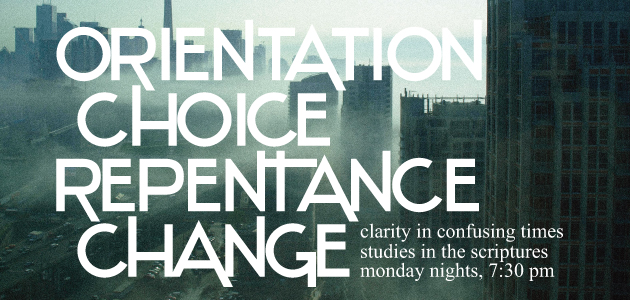Last night we began our discussion on some of the pressing issues in our day by looking at the bible’s concept of orientation, and how the issue of repentance figures into the discussion. Here are the notes:
Orientation and the Scriptures
The Current Idea of Orientation: An attempted definition: Orientation is how you are, and feel, in the deepest part of you. It’s the things you like; it’s the ways you think and feel. Things inside of you can’t change, or at least can’t easily change, even if you try hard. It’s probably a way you were born.
Since, today, this word mostly makes us think of sexual orientation, here’s a definition of that: “Sexual orientation refers to an enduring pattern of emotional, romantic, and/or sexual attractions to men, women, or both sexes. Sexual orientation also refers to a person’s sense of identity based on those attractions, related behaviors, and membership in a community of others who share those attractions.” – www.apa.org
1. Does the Bible agree with this way of seeing things? Yes.
The Bible’s View of Orientation.
The bible has an idea of orientation stretches beyond sexuality in general. It is actually a “big” idea, and is helpful for thinking about who we are in total as human beings, at least with regards to our inner life and our deepest beings.
But in the Bible, instead of using the word we currently use–orientation–the word that is used for this big concept is the word “heart.”
Proverbs 4:23 “Guard your heart with all diligence, for out of it flow the issues of life.”
“This word—“Heart is the most important anthropological term in the Old Testament, but the English language has no equivalent. It occurs…858 times in the OT….No other English word combines the complex interplay of intellect, sensibility and will…The heart feels all modes of desire, from the lowest physical forms, such as hunger and thirst, to the highest, spiritual forms, like reverence and remorse…[The] direction or bent of the heart determines its decisions and thus the person’s actions.” [– Bruce Waltke on Proverbs 4:23]
“‘Heart’ is the term most commonly used in biblical literature for the essential personality. Whereas in English ‘heart’ tends to connote emotion, in both Hebrew and Greek it conveys equally, and perhaps more strongly, the spiritual and intellectual processes, including the will. It refers to what makes people what they really are, their individuality.” [R.T. France on Mark 7:19]
We see the same thing in the New Testament: Mark 7:14-23. It is from the heart that the actions of life flow.
Three observations:
- The bible describes human beings as being characterized by an inward bent of feelings, desires, preferences, and thoughts. It is what we’d call an “orientation.” Sexual orientation, as a description of your sexual feelings, desires, and preferences, is part of your overall orientation.
- This heart, this orientation is something that is innate to us, and starts when we’re small and slowly works its way out as we grow older. (Proverbs 22:15)
- This orientation is responsible for our actions.
2. Question: Does the fact that we are a certain way, or that our hearts are a certain way, mean that God is OK with us? Does God approve or disapprove of our heart, or orientation, as it is?
Our Culture’s view: If you are a certain way, if you have a certain orientation, it is good and right that you live out that orientation, and it is good for you to be freed up to pursue your happiness according to this inner orientation. Since this is the way things are, we must realize that God made things this way, and therefore he does not disapprove of someone acting out of their deepest desires and innermost being. What matters is that we love each other by freeing each other up to find positive ways to live out this orientation in a culture free from oppression.
Taking these things all together, the issue that has raised itself up in our culture is this:
Are we as human beings basically acceptable to God, or does He require some fundamental change before he accepts us?
Scripture’s view: The vast majority of verses (and there are many) which speak of human orientation (the human “heart”) are not positive, or even neutral (like Proverbs 4:23), but negative: See, for instance, Gen 6:5-6, Gen 8:21, Deut 29:14-20, Psalm 81:8-13, Jer 11:8, Jer 18:11-12, Jer 17:9, Eph 2:1-3, Heb 3:10-13, Eph 4:17-19, and especially Romans 3:10-20.
3. Answer: Scripture presents a picture of a humanity who is fundamentally bent away from God, and displeases and dishonors him because they act on their orientation.
This explains a fundamental word for understanding all of the Bible, and a main word in Jesus teaching: “Repent.” See Matthew 4:17, and Luke 13:3, Mark 1:15, Mark 6:12, Acts 17:30, 2 Peter 3:9
For a picture about what the mental and emotional state of repentance looks like, see Psalm 51:1-10.
4. Sum up and Challenge:
A big question: How do we know that any part of our orientation should be encouraged or lived out? The bible says we have the capacity to deceive ourselves, and we often do.
Non-Believers: See 1 John 4:9 God’s love to humanity is extended in finding us helpless as we are, but providing the way for us to be freed and given life eternally. See Luke 24:46-48. Anything or anyone who tells you not to repent keeps you from God’s love, and blocks the door to eternal life. They don’t speak for Christ, and they aren’t on your side. Don’t listen to those who have no weight or authority to their words. Listen to the love of God speaking to you.
Christians: First, be Bereans. (Acts 17:11) Study the scriptures to see what’s true. Second, let’s confess and turn away from our sins as well. We can’t preach repentance and freedom from sin if we are entangled in the very same things.

